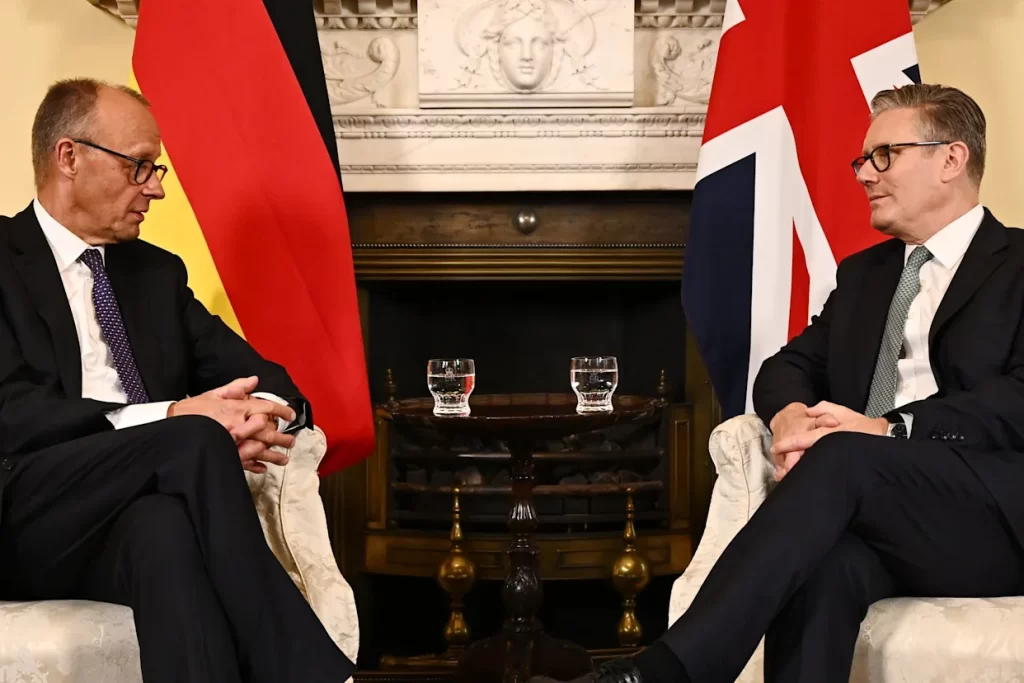On August 15, 2025, the United Kingdom and Germany signed a landmark mutual defense pact directed at countering potential Russian aggression, a decision that marks a critical turning point in the evolution of Europe’s security posture. In an era defined by mounting geopolitical confrontations and renewed great power rivalries, the agreement between London and Berlin signals both the deepening urgency of the Russian threat and a fundamental reshaping of Europe’s strategic calculus. This is not just a regional shift, it is a global development that projects a message of cohesion and resolve.
From a historical perspective, the pact bridges centuries of divergence in security philosophy. Britain has typically prioritized its global reach and transatlantic orientation through its partnership with the United States, while Germany, restrained by its postwar pacifist legacy, long remained cautious about proactive defense commitments. Russia’s ongoing war in Ukraine, combined with its strategy of energy coercion, cyber operations, and nuclear signaling, has dissolved many of these inhibitions. By formalizing a mutual defense pledge, Britain and Germany acknowledge that NATO remains indispensable, yet also recognize that parallel arrangements are required to reinforce deterrence and to ensure Europe can act decisively in moments of crisis.
The global dimension of the pact should not be underestimated. Russia no longer defines itself as merely a European disruptor but increasingly as the spearhead of a wider anti-Western coalition, positioning alongside China, Iran, and select states across the Global South that oppose what they perceive as Western dominance. In this wider context, the UK-Germany pact is not solely defensive. It is a political declaration that Europe will not operate in denial about shifting threats, nor will it allow Moscow to exploit divisions among allies. For Washington, this is both encouraging and challenging, encouraging because it reflects the long-sought idea of European burden-sharing, challenging because it highlights the possibility of Europe moving toward greater strategic autonomy, which could complicate consensus inside NATO.
For Moscow, the symbolism is unavoidable. Russia has often banked on European disunity, betting that hesitation and internal debate would limit Western resolve. The new pact undermines that approach. Britain brings hard power credibility, with nuclear deterrence, naval strength, and operational experience. Germany contributes economic capacity, industrial reach, and political centrality within the European Union. Combined, their commitment recalibrates the European balance of power, imposing new constraints on Russia’s room for escalation.
The impact extends well beyond Europe. In Asia, governments in Tokyo, Seoul, and Canberra face dilemmas regarding China that resemble Europe’s challenges with Russia. From their perspective, the UK-Germany pact offers a template. Middle powers can build flexible, binding alignments in order to compensate for uncertainties in global security institutions. This represents a growing trend toward minilateralism, where coalitions of like-minded states establish issue-specific commitments that complement broader organizational frameworks. Just as AUKUS and the Quadrilateral Security Dialogue in Asia reinforce alliances beyond traditional NATO-style guarantees, so too does the London-Berlin pact foreshadow the future of regional collective defense.
Yet hurdles remain, both political and structural. Germany has pledged to meet increased targets for military spending, but whether its domestic politics and defense industry can keep pace with its new commitments remains uncertain. Britain, meanwhile, grapples with resource pressures and questions about its reach in the post-Brexit environment. The effectiveness of this agreement will ultimately rely on visible and practical enhancements to defense readiness, such as joint military procurement, combined training operations, and deeper integration in areas like cyber defense. Without such concrete measures, the pact risks being dismissed as symbolic rather than transformative.
European partners are now weighing how this development will shape their own security. France, long an advocate of European strategic autonomy, may view the pact as both an opportunity and a rivalry, since any bilateral axis reshapes the balance within EU defense concepts. Smaller Eastern and Central European states, whose proximity to Russia leaves them highly exposed, will expect assurances that their security is strengthened rather than sidelined. To maintain coherence, it is critical that the UK-Germany pact be framed explicitly as complementary to NATO, reinforcing rather than fragmenting the alliance.
At the global level, the agreement illustrates a broader trajectory in international security. The reliance on a single global hegemon to preserve international order is giving way to a mosaic of overlapping alliances and coalitions. Whether in Asia, Europe, or other regional settings, states now seek flexible, layered guarantees that provide resiliency in the face of unpredictable threats. From Latin American debates over transnational security to the growing architecture of Asian defense cooperation, the logic is consistent with what London and Berlin have now formalized.
The true significance of the UK-Germany pact lies in what it reveals about political will. Europe is now acknowledging that defense cannot be outsourced indefinitely, and that credible deterrence requires risk-sharing and decisive action. Globally, the pact signals that in the twenty-first century, deterrence is no longer the monopoly of hegemonic institutions but requires smaller yet robust coalitions prepared to act when norms and borders are threatened.
For policymakers and strategists, the message is clear: this bilateral pact must be the beginning of a deeper and more flexible architecture, not an isolated gesture. Its success will shape not only Europe’s ability to deter Russia but also the future credibility of alliances and coalitions worldwide. As the balance of power shifts and strategic rivalries intensify, the London-Berlin compact of August 15, 2025, will be remembered either as a bold step toward a resilient security order or as a missed opportunity to adapt to the world’s evolving dangers.
